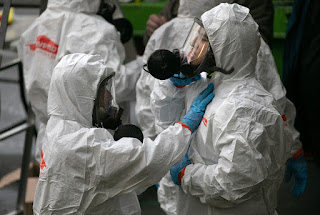10 things on my mind about covid-19
1. Wealthy urbanites are fleeing to their second homes -- buying out grocery stores, expecting personal shoppers and home delivery, swelling vacation towns' size to summer proportions. This is the epitome of the egocentric, classist arrogance that often pervades the United States.
2. In India, a planned lockdown of more than a billion people is expected to leave millions dead of starvation. As people become desperate, there will inevitably be rioting, police shootings, and all forms of rampant violence. In this case the response seems far worse than the pandemic itself.
3. Many people seem to have forgotten that the majority of COVID-19 case are not fatal. I'm not minimizing the potential, but numbers of confirmed cases does not equal the same number of deaths.
4. Our experience of the pandemic often depends on our employment situation. For me right now, it's a vacation. Health care workers have so much added risk and all the stress that comes with it. Supermarket workers and delivery people are suddenly on the front lines, in jobs that were never meant to carry such risks.
5. What portion of the government stimulus packages will directly benefit people in need and how much will be corporate bailouts? This is the full extent of a corrupt corporatocracy in action, on both sides of the aisle.
6. I'm concerned about people who can't navigate the information onslaught to figure out how to apply for help. Many of them would normally seek help at the public library -- but the libraries are closed.
7. Many customers at my library can't afford internet or cable TV. They rely on the library as their only source of internet and on borrowing DVDs for entertainment. I think of them often. How are they passing the time?
8. In Canada, the largest retail employers have been giving their workers a $2/hour pay bump -- thanks to the UFCW, with others following their lead. I hope the agreements have made these raises permanent. I can easily imagine cheapskate companies like Loblaws clawing back the increase when the all-clear signal sounds.
9. What happens to all the people whose health is compromised by poverty and who cannot isolate: people who live in refugee camps, homeless shelters, and the vast shantytowns in Brazil, Pakistan, Nigeria, and elsewhere? I'm sure many in the ruling class hope the pandemic helps these problems disappear, and the rest of us can do little more than shake our heads.
10. I'm afraid that testing and medication is being triaged backwards, to exclude people with disabilities, especially those who require more care. The most needy cases are supposed to be helped first. Triage is not supposed to be a judgement of your worth to society as a worker.
* * * *
11. Bonus track: remember "we like lists"? Those posts drew dozens, sometimes hundreds, of comments. All currently gone. But I haven't given up. A human at Blogger/Google has taken up my case. I'm refusing to think that this will be permanent.
2. In India, a planned lockdown of more than a billion people is expected to leave millions dead of starvation. As people become desperate, there will inevitably be rioting, police shootings, and all forms of rampant violence. In this case the response seems far worse than the pandemic itself.
3. Many people seem to have forgotten that the majority of COVID-19 case are not fatal. I'm not minimizing the potential, but numbers of confirmed cases does not equal the same number of deaths.
4. Our experience of the pandemic often depends on our employment situation. For me right now, it's a vacation. Health care workers have so much added risk and all the stress that comes with it. Supermarket workers and delivery people are suddenly on the front lines, in jobs that were never meant to carry such risks.
5. What portion of the government stimulus packages will directly benefit people in need and how much will be corporate bailouts? This is the full extent of a corrupt corporatocracy in action, on both sides of the aisle.
6. I'm concerned about people who can't navigate the information onslaught to figure out how to apply for help. Many of them would normally seek help at the public library -- but the libraries are closed.
7. Many customers at my library can't afford internet or cable TV. They rely on the library as their only source of internet and on borrowing DVDs for entertainment. I think of them often. How are they passing the time?
8. In Canada, the largest retail employers have been giving their workers a $2/hour pay bump -- thanks to the UFCW, with others following their lead. I hope the agreements have made these raises permanent. I can easily imagine cheapskate companies like Loblaws clawing back the increase when the all-clear signal sounds.
9. What happens to all the people whose health is compromised by poverty and who cannot isolate: people who live in refugee camps, homeless shelters, and the vast shantytowns in Brazil, Pakistan, Nigeria, and elsewhere? I'm sure many in the ruling class hope the pandemic helps these problems disappear, and the rest of us can do little more than shake our heads.
10. I'm afraid that testing and medication is being triaged backwards, to exclude people with disabilities, especially those who require more care. The most needy cases are supposed to be helped first. Triage is not supposed to be a judgement of your worth to society as a worker.
* * * *
11. Bonus track: remember "we like lists"? Those posts drew dozens, sometimes hundreds, of comments. All currently gone. But I haven't given up. A human at Blogger/Google has taken up my case. I'm refusing to think that this will be permanent.


Comments
Post a Comment